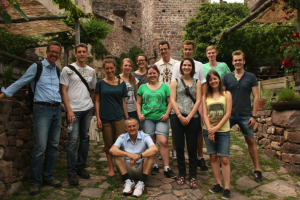By Christie Wisniewski//
As a young boy, Dr. Scott Pincikowski never imagined he would be a German professor, speaking the language fluently and making annual trips to Germany.
“I originally wanted to be a chemist,” he said, laughing.
His fascination with the language occurred after his older brother Tim, introduced him to some high school German exchange students. One day, these exchange students began to speak German in front of him.
“It frustrated me,” Pincikowski admitted, cracking a smile.
This frustration motivated him to begin learning the language. In middle school, he took a “World of Languages” course that briefly introduced students to different languages. According to Pincikowski, when the German section was taught, he became hooked. The summer after his senior year in high school, he participated in an exchange program and visited Germany for the first time.
Pincikowski has been employed as a professor at Hood College since 2001. In addition to teaching every level of the German language, he also teaches German literature and culture classes.
Hood College offers both a major and a minor in German, and beginner to advanced classes. Those students who have taken at least three levels of German can opt to live in the German house, where the students living there are expected to “live German,” according to Pincikowski.
“Hood College is fortunate that we have language houses,” Pincikowski said. “We’ve had language houses for 75 years. The German house, not as long, but probably 35 years.”
Frederik Hess is one of the German exchange students who lives in the German house.
“It’s interesting because I’m speaking English everywhere and when I’m in the German house I get to speak my native language,” Hess said. “It’s kind of like a piece of home in a foreign country and it’s nice.”
The German house, according to Hess, is a duplex with a shared kitchen, living room, and dining room. There are two bathrooms, one single bedroom, one double, and one triple.
“Living in a small house, you make close friends, friends for life,” Marie Schmitt, a French Language assistant at Hood said. “(Each) house has its own personality…”
In 2002, Pincikowski published his book, “Bodies of Pain: Suffering in the Works of Hartmann Von Aue,” a 12th century German poet. He says this book focuses on the depiction of pain in courtly romances.
“Think knights in shining armor,” said Pincikowski, who also considers himself a medievalist by trade.
This summer, Pincikowski has planned an experiential learning trip to Berlin for interested students.
“Students actually become experts on specific topics,” said the professor. “This year I have students researching life in Berlin towards the end of World War II.”
“Those trips have always been very fulfilling,” Pincikowski said. “Not only is it a part of my job, it’s a part of who I am. I like coming into close contact with Germans and German speakers. I’m so passionate about it I want to know more.”
In addition to school trips, Pincikowski tries to visit Germany at least once a year so that he can stay fluent. Germany is not the only place he travels, and he stressed the importance of traveling to countries other than ones’ own. According to Pincikowski, the media distorts perceptions of other places and does not come close to showing people what it is like to travel. He says that people need to experience travel for themselves and not through the television.
“Today we have a responsibility to travel abroad,” he said. “You really see your own country in a different way. Traveling for me is self-discovery. Germany has really made me, and is making me who I am.”
